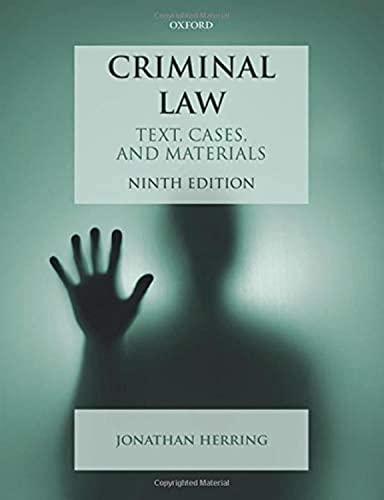Question
Moot Court Problem T1, 2023 1...Auto-Franchising Limited ('Auto') is a company incorporated in the State of New England. It runs a nationwide automotive spare-parts business.
Moot Court Problem
T1, 2023
1...Auto-Franchising Limited ('Auto') is a company incorporated in the State of New England. It runs a nationwide automotive spare-parts business. The core operations of Auto revolve around numerous franchised automotive parts stores. Independent operators own each store. They operate under a franchise agreement with Auto. The franchisee stores source all of their stock from Auto. By early 2012, Auto had franchise agreements in place with about 120 stores. These stores were predominantly located along the Australian eastern seaboard. Pursuant to prior legislation and the Competition and Consumer Act 2010 (Cth), the ACCC had authorized this exclusive dealing
2...In January 2012, Western Automotive Pty Ltd ('Western') approached Auto. Western owned and operated three automotive parts stores in and around Perth, Western Australia ('WA'). Western wished to grow its operations. It was aware that Auto wanted to expand into the WA market. During discussions, Western and Auto agreed that Auto would assist Western to become the 'master franchisee' for the Auto brand in WA.
3...The arrangement would involve Western appointing and dealing with sub-franchisees under the Auto name in the WA market. Auto would supply most of the stock. Western would on-sell this to its franchisees. Auto also agreed to allow Western to buy some stock direct from third party suppliers at the special prices Auto negotiated.
4...During negotiations, the managing director of Auto said '...we are happy for you to buy from any third-party suppliers. But, to be fair, you will have to pay us a commission of 5% of the wholesale value of anything you buy from any third parties for supply to Auto-branded stores.' In reply, the manager of Western said '...that sounds fine, but we'll get our lawyers to figure out the wording'.
5...In March 2012, Auto and Western signed a letter of agreement setting out the terms of their franchise arrangement. The term in dispute stated:
(vii)...If Western sources stock from any third-party supplier under special pricing that Auto negotiates, then Western will pay to Auto a commission of five percent of the ex-factory price of all such stock that Western sells to Auto-branded stores in WA.
6...The parties commenced operations under the letter of agreement. The businesses were successful. After five years, Western had signed up 19 Auto-branded franchise stores in the WA market. During that time, Western purchased about 70% to 80% of their stock from Auto. Western sourced the remaining 20% to 30% direct from third-party suppliers. It did this under various bulk-buying deals that Auto arranged. Western paid 5% commission to Auto as agreed.
7...In early 2016, Auto discovered that Western had also been conducting its own negotiations with two third party suppliers from overseas. Western was purchasing some stock direct from the third parties. It was then selling it to Western's franchised Auto-branded stores in WA. Western was also selling some of this stock into four Auto-branded stores that Auto had franchised in South Australia ('SA'). Western was not paying to Auto the 5% commission for this stock. Western rationalised that it only owed the commission on stock bought under deals Auto negotiated.
8...Consequently, Auto requested that Western honour the spirit of their agreement. Auto asked Western to pay $120,000 commission on $2.4 million of stock. This represented the value of stock that Western purchased from the overseas suppliers and sold to the WA and SA Auto-branded stores since mid-2013. Western refused. So, Auto sued Western for the unpaid commission.
9...The matter first came on for hearing in the Commercial Division of the Supreme Court of New England. The court held that Auto was entitled to recover damages to the full value of the unpaid commission. The Court reasoned that Pacific Carriers Ltd v BNP Paribas (2004) 218 CLR 451 (Pacific Carriers) permitted the Court to consider the surrounding circumstances of the negotiations when construing clause 7 of the letter of agreement. The parties did not contest the truth of the above oral statements each made during the negotiations.
10...Western promptly filed a Notice of Appeal in the Supreme Court of New England Court of Appeal, relying upon the following grounds:
- That the learned trial judge erred in applying the reasoning in Pacific Carriersto allow the oral statements into the construction of the contract.
- That the learned trial judge should have held that clause (vii) was unambiguous and therefore limited Western's liability to the commission already paid.
- That the learned trial judge should have followed 'the true rule' in Codelfa Construction Pty Ltd v State Rail Authority (NSW)(1982) 149 CLR 337.
Written Submissions - Marking Sheet
Senior Counsel
Surname: ____________ First name: ____________ Student No: ____________ Junior Counsel
____________ ____________ ____________
Research
|    |
Step by Step Solution
There are 3 Steps involved in it
Step: 1

Get Instant Access to Expert-Tailored Solutions
See step-by-step solutions with expert insights and AI powered tools for academic success
Step: 2

Step: 3

Ace Your Homework with AI
Get the answers you need in no time with our AI-driven, step-by-step assistance
Get Started


